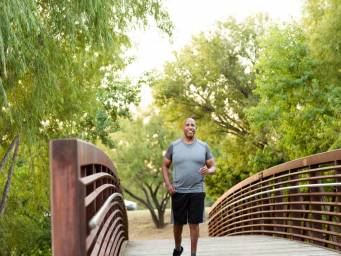
Standing burns more calories than sitting or lying

Compared with sitting or lying down for the same amount of time, standing uses more energy. This could help to burn calories that would otherwise end up in fat storage.
These are among the findings and conclusions of a recent PLOS One study from the University of Granada (UGR), in Spain.
Many scientists believe that lying, sitting, and standing use up different amounts of energy.
However, until the recent study, no one had quantified the energy differences between the three behaviors.
In the new investigation, corresponding study author Francisco J. Amaro-Gahete and colleagues calculated that the body expends 45 more kilocalories per 6-hour period when standing, compared with lying down or sitting.
The team found little significant difference in energy expenditure between lying and sitting.
Health hazards of prolonged sitting
"We Spaniards spend between 8 and 10 hours sitting or lying down each day, not counting the hours we are asleep," says Amaro-Gahete, who is studying for a Ph.D. in biomedicine at UGR.
Prolonged sitting is also common in the United States. A 2018 study by the Centers for Disease Control and Prevention (CDC) found that around 25% of people in the U.S. spend more than 8 hours per day sitting.
The new findings follow numerous studies on the health hazards of prolonged sitting and the benefits of reducing it.
A study that spanned 45 years concluded that being physically inactive is second only to smoking as a risk factor for early death.
Even short bouts of activity can reduce the health risks of a sedentary lifestyle, according to other research that reviewed dozens of studies.
Another study of adults in middle age and older also found that prolonged sitting can harm the brain. Even high levels of physical activity appear to make no difference.
"Therefore, if we take steps to combat a sedentary lifestyle by making small lifestyle changes," Amaro-Gahete suggests, "such as spending more time standing, this could reduce the risk of developing diseases such as obesity or type 2 diabetes."
Savers vs. spenders of energy
For the new study, the researchers measured energy expended during time spent sitting, lying, and standing in 55 healthy adults. The average age of the volunteers was 21.7 and 69% of them were female.
The team used a noninvasive method called indirect calorimetry to measure energy expenditure in each of the three positions: sitting, standing, and lying down.
Indirect calorimetry is one of the most accurate and sensitive ways of measuring a person's energy use noninvasively.
The method measures energy expenditure from the amount of oxygen that the body uses and the amount of carbon dioxide that it releases.
As well as demonstrating that, in general, standing uses more energy than sitting and lying, the study found that the participants fell into two types of energy users: savers and spenders.
It seems that spenders use more energy when they switch from lying or sitting to standing.
"Savers consume very little energy in their activities and, therefore, the difference between sitting [and] lying or standing is practically nil for them," Amaro-Gahete explains.
Spenders, on the other hand, burn around 10% more energy when they switch to standing from lying or sitting, he adds.
Muscle mass could be a factor
Researchers are still trying to figure out why some people are energy savers and others are energy spenders.
The answer to that question could help explain why some people lose weight with great difficulty while others do so with ease.
In conclusion, the researchers suggest that people with sedentary occupations, such as office workers, should spend more time standing up.
While the findings appear to support the use of desks that people can adjust to allow them to work standing up, there are other ways to counteract the effects of prolonged sitting.
The important thing is to change position, says senior study author Jonatan R. Ruiz, Ph.D., an associate professor in the Faculty of Sport Sciences at UGR.
"If a person were to get up, take 10 steps, and sit down again, it appears that the effects of a sedentary lifestyle would be greatly reduced."
Jonatan R. Ruiz, Ph.D.
SOURCE:
Published on 9/10/19
You Might Also Enjoy...


How NightLase® Can Help With Snoring

How Laser Therapy Can Help Decrease Vaginal Dryness and Increase Sexual Pleasure

Five Signs You Could Be Suffering From Low Testosterone

Why Do I Still Get Acne, and How Can I Get Rid of It Without Medication?


